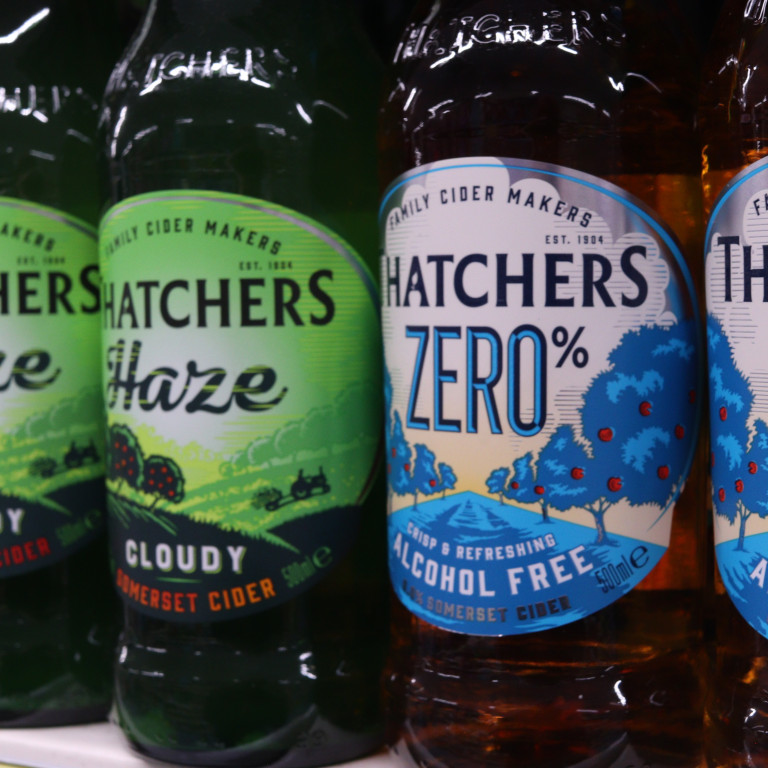The UK has been no stranger to the battle of the brands with numerous cases cropping up over lookalikes. IP lawyers have been eagerly awaiting the judgment on trade mark infringement in the Thatchers v Aldi case which was handed down in the Intellectual Property and Enterprise Courts on 24 January 2024. Thatchers’ claim was unsuccessful.
What was the issue?
Trade marks can be registered as words, logos or a combination of both. Increasingly brand owners are registering trade mark logos featuring a combination of words and artwork which they print on their products and packaging.
Thatchers is the registered owner of a trade mark logo consisting of the Thatchers name, the words “CLOUDY LEMON CIDER” and lemons. The trade mark has been used in the following ways since 2020 for the cloudy lemon cider:
· On the packaging on the outside of cans;
· In advertising and promotion for the product; and
· On the cardboard containers of 4-can packs.
In or around 2022 Thatchers became aware that Aldi had started to sell a cloudy lemon cider product under the name “TAURUS”. The branding design printed on the product and the packaging, contains words, colours and artwork not dissimilar to the Thatchers trade mark and Thatchers claimed it was infringing because:
1. Aldi’s branding was similar to their trade mark and is used in relation to the same goods (cider);
2. Thatchers’ trade mark has a reputation in the UK and Aldi’s sign takes unfair advantage of the distinctive character or repute of the trade mark; and
3. Thatchers unregistered trade mark rights have been infringed (passing off).
The case failed mainly because the judge found there to be a lack of similarity.
What is unfair advantage?
We’ve all heard about trade mark infringement – where a Defendant uses product branding that is identical or similar to the Claimant’s trade mark – but what about “unfair advantage”?
Some registered trade marks have a distinctive reputation in the UK and “unfair advantage” refers to a situation where a person or business gains an unfair commercial advantage by using an identical sign and attempting to trade on the trade mark’s reputation. The question is: Does the court deem the average consumer likely to make a link between the Defendant’s product branding and the Claimant’s trade mark?
Thatchers pleaded that the overall appearance of the Aldi product branding is highly similar to that of theirs and that the court should infer that Aldi intentionally mimicked the appearance of the Thatchers cider in designing the appearance of their product branding and in doing so:
· Intentionally set out to cause a link in the minds of consumers between the two in order to encourage consumers to buy the Aldi cider; and
· Took unfair advantage of, or caused detriment to, the distinctive character and repute of Thatchers’ trade mark.
What did the court decide?
Her Honour Judge Melissa Clarke found that Thatchers’ trade mark has gained reputation and enhanced distinctiveness in the UK – but:
1. The Aldi product branding has a low degree of similarity to the Thatchers trade mark;
2. There is no likelihood of confusion;
3. While Aldi’s use of the product branding was intentional benchmarking to the Thatchers trade mark and has caused a link in the mind of the average consumer, Aldi’s use does not take unfair advantage of and is not detrimental to the repute of the Thatchers trade mark and;
4. Accordingly, Aldi is not liable for trade mark infringement or passing off.
Overall, the judge found a low degree of similarity between the trade mark and Aldi’s product branding because the dominating feature of the Thatchers trade mark is the word “THATCHERS” and the dominating features of Aldi’s are the words “TAURUS” and the bull head logo which do not appear on the Thatchers cider.
Conclusion
On the one hand, the judge said the Thatchers trade mark as a whole has distinctive character and reputation which is a positive reassurance to brand owners, but on the other hand she did not uphold their infringement claim. The decision is confusing. Is there a tension between how the courts view packaging and how consumers view packaging and products? To add to the confusion, while the judge said that Aldi had used Thatchers product for inspiration, she still found that on balance Aldi had not had an intention to take advantage of the trade mark.
Do consumers focus on the brand name – “THATCHERS” or “TAURUS” – or do they focus more on the colour, artwork and shape and get up of the packaging which Aldi uses to rides on the coat tails of Thatchers’ brand reputation? A 2023 report on The Psychology of Lookalikes advocates for the latter. In short, the essence of the behavioural science is that customers recognise, trust and buy lookalike products because they mimic the brand leaders. If the products were instead marketed in plain packaging which bore no similarity to the brand leaders would customers still buy them? It is likely that the third parties would need significant advertising to build trust in their own products.
The courts are now faced with a unique opportunity to step into the shoes of consumers instead of approaching infringement cases through an IP lawyer’s lens. This change in perspective will help protect the substantial investment that brands put into the design and marketing of the packaging. Is there an ap-peel on the horizon? Keep up to date with Tozers’ intellectual property insights by visiting our website.




